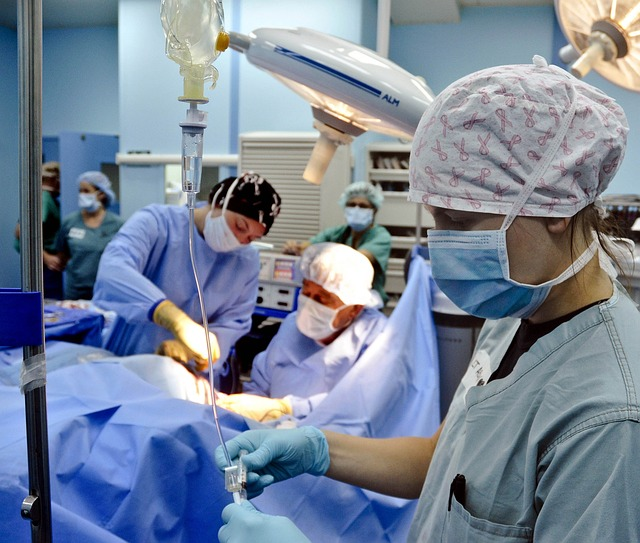How to Become a Registered Nurse First Assistant (RNFA)
How to Become a Registered Nurse First Assistant (RNFA)
In the realm of healthcare, where compassion and expertise meet to mend and heal, the role of a Registered Nurse First Assistant (RNFA) stands as a shining beacon of specialized care and dedication. As a pivotal surgical team member, the RNFA combines their profound nursing knowledge with surgical skills, weaving a tapestry of compassion and precision to ensure the best possible outcomes for patients undergoing surgery. “How to Become a Registered Nurse First Assistant (RNFA)” embarks on a journey of discovery, unveiling the path to this unique and fulfilling career. Join us as we unravel the intricate steps to becoming an RNFA, where passion for patient care converges with the artistry of surgery, creating a harmonious symphony of healing and hope.
What Does An RNFA Do?
An RNFA, or Registered Nurse First Assistant, is a nurse who assists the surgeon in the operating room during surgical procedures. They provide valuable aid to surgeons and other operating room staff by contributing to preoperative assessment, patient positioning and preparation for surgery, as well as helping with intra-operative technical skills such as controlling bleeding, suturing incisions and performing other essential medical tasks under the direction of the surgeon. After surgery, RNFAs help with post-operative care such as wound aftercare and dressing changes.
RNFAs combine both nursing and medical functions in order to support the patient before, during and after their operation. Their additional knowledge and training gives them increased abilities in an operating room that sets them apart from regular nurses. It is their job to understand the needs of both the nurse team and attending physician while working efficiently alongside other members of the surgical team. As skilled professionals with multifaceted capabilities, RNFAs can play a decisive role in successful Patient care outcomes throughout all stages of their treatment plan.

Becoming A Registered Nurse
For the purpose of becoming a registered nurse student can obtain the nursing certificate from any approved nursing school. RNs work in doctor’s clinics, hospitals or medical facilities. Alternately, they may work within school clinics or nursing homes. Advanced Practice Registered Nurses have doctorates, masters and postgraduate certificates in Clinical Nursing Practice. RN students can study the following areas of study: psychology, pharmacology, anatomy, nutritional sciences, pharmacokinetics, and patient care. Once coursework has finished a student can complete the RN exam.
Must-Reads: What Is Perioperative Nursing?
Admission Eligibility To Be An RNFA
Candidates typically need to meet specific criteria to be eligible for admission into a Registered Nurse First Assistant (RNFA) program. While the specific requirements may vary depending on the educational institution and the program, the general eligibility criteria often include:
Registered Nurse License:
Candidates must be licensed as registered nurses (RN) in their respective states or countries. This license is usually obtained after completing an accredited nursing program and passing the National Council License Examination for Registered Nurses (NCLEX-RN).
Explore Related Content: What Is An Advanced Practice Nurse
Work Experience:
Many RNFA programs require applicants to have minimum clinical experience as a registered nurse. This experience can vary but often ranges from one to two years in a surgical or preoperative setting.
Expert Opinion: How Much Does Nursing School Cost
Education:
Candidates must have a diploma, associate degree, or bachelor’s degree in nursing from an accredited institution. Some programs may prefer candidates with a Bachelor of Science in Nursing (BSN) degree.

Certifications:
While only sometimes admission is mandatory, certifications like Basic Life Support (BLS) and Advanced Cardiovascular Life Support (ACLS) can enhance an applicant’s qualifications.
References:
Applicants may need to provide letters of recommendation from nursing supervisors or colleagues who can attest to their clinical skills and abilities.
Statement Of Purpose:
Some programs may require a statement of purpose or a personal essay in which applicants explain their interest in becoming an RNFA and their career goals.
Interview:
Some institutions may conduct interviews as part of the admissions process to assess the applicant’s suitability for the program.
Prospective students need to research the specific admission requirements of the RNFA program they are interested in, as each program may have unique prerequisites and application procedures. Meeting these eligibility criteria is crucial to pursuing a rewarding career as a Registered Nurse First Assistant.
How To Become An RNFA
-
Become An RN (Registered Nurse):
To become an RNFA, you first need to become a registered nurse. There are several educational pathways to achieve this:
- Bachelor Of Science In Nursing (BSN): Obtain a BSN degree from a college or university. This typically takes four years to complete.
- Associate Degree In Nursing (ADN): Earn an ADN from a community college or technical school. This program usually takes about two to three years.
- Nursing Diploma: Complete a nursing diploma program offered by some hospitals takes about two to three years.
- Gain Experience As An RN: After becoming a registered nurse, gain experience in the nursing field. Many RNFA programs require a certain amount of clinical experience before you can enroll. The number of years of experience needed may vary, but having at least two years of experience is common.
-
Complete An RNFA Program:
Enroll in an accredited RNFA program. These programs provide specialized education and training in surgical assisting. They typically cover topics such as surgical techniques, anatomy, wound management, and preoperative nursing care. The program may be offered as a post-graduate certificate or as part of a master’s degree program.
-
Meet Clinical Requirements:
During your RNFA program, you will likely need to complete several supervised clinical hours in a surgical setting. These clinical experiences allow you to apply the knowledge and skills learned in the program.
-
Apply For Certification:
After successfully completing the RNFA program and meeting all the necessary clinical requirements, you can apply for certification through a recognized certifying body, such as the Competency & Credentialing Institute (CCI) or the Association of periOperative Registered Nurses (AORN). The certification process may involve passing an exam to demonstrate your proficiency as an RNFA.
-
Maintain Certification:
Once you become a certified RNFA, you will need to maintain your certification by fulfilling continuing education requirements or periodically renewing your certificate, as required by the certifying body.
Please note that the requirements for becoming an RNFA may vary depending on your location and your chosen certification body. Always check the requirements of the program and certification organization you are interested in to ensure you meet all the criteria.

RNFA Skills
Registered Nurse First Assistants (RNFAs) require essential hard and soft skills to excel. These skills are crucial for the job and are emphasized in cover letters and employment applications. In addition to communication and interpersonal skills, RNFAs must possess many other must-require competencies.
Critical Thinking And Decision Making:
RNFAs must think critically and make quick, sound decisions during surgical procedures. They must assess situations, anticipate potential complications, and act promptly to ensure patient safety and positive outcomes.
Surgical Knowledge And Expertise:
A comprehensive understanding of surgical procedures, anatomy, and surgical techniques is essential for RNFAs to assist surgeons during operations effectively.
Attention To Detail:
RNFAs must be detail-oriented to assist with intricate surgical tasks, suture wounds precisely, and ensure all necessary instruments and supplies are readily available.
Adaptability And Stress Management:
Surgical environments can be fast-paced and high-pressure. RNFAs should remain calm under stress, adapt to changing circumstances, and maintain focus during lengthy procedures.
Professionalism And Ethics:
Upholding a high standard of professionalism and adhering to ethical principles are paramount in the healthcare setting. RNFAs must prioritize patient welfare and maintain confidentiality.
Technical Competence:
RNFAs should be proficient in using surgical instruments and equipment and understanding and interpreting surgical data and imaging.
Collaboration And Teamwork:
Working closely with surgeons, nurses, and other healthcare professionals requires strong collaboration skills to ensure seamless coordination in the operating room.
Continuous Learning:
Staying updated with advancements in surgical techniques and healthcare practices is crucial for RNFAs to provide the best possible care to patients.
Incorporating these skills into their practice, RNFAs play a vital role in surgical teams, contributing to successful surgeries and improved patient outcomes.
Where Do RNFAs Work?
Registered Nurse First Assistants (RNFAs) find their primary work setting in hospital operating rooms, where they play a crucial role in assisting surgeons during various procedures. Operating rooms offer a dynamic and challenging environment, allowing RNFAs to effectively utilize their surgical knowledge, technical expertise, and communication skills.
Beyond the traditional operating room, RNFAs have diverse employment opportunities across different healthcare facilities. They may extend their expertise to the emergency room, where their quick decision-making and critical thinking abilities prove invaluable in urgent situations. Additionally, RNFAs may contribute their skills in emergency medical care centers, dental offices, plastic surgery practices, and otolaryngology (ENT) offices.

In emergency settings, RNFAs are instrumental in providing immediate care and support to patients with life-threatening conditions. Their suturing skills and attention to detail are essential in dental and plastic surgery practices in achieving optimal surgical outcomes. Meanwhile, in otolaryngology offices, RNFAs assist in procedures related to the ear, nose, and throat, addressing a variety of medical concerns.
The adaptability of RNFAs to work in diverse healthcare settings showcases the versatility and depth of their expertise. Regardless of the facility, RNFAs play a vital role in supporting surgical teams, contributing to positive patient experiences, and ensuring successful surgical outcomes across various medical specialties.
What Are The Job And Salary Outlooks For RNFAs?
The job outlook for Registered Nurse First Assistants (RNFAs) is generally promising, with a growing demand for skilled surgical nursing professionals in the healthcare industry. While specific salary data for RNFAs may not be available from the Bureau of Labor Statistics, general Registered Nurse (RN) salaries are reported to be around $83,750 annually. However, RNFAs tend to earn slightly higher average earnings, with an estimated salary of approximately $86,311.
It’s essential to consider that salaries for RNFAs may vary based on factors such as experience, location, and the type of healthcare facility they work in. Some states offer higher compensation for RNFAs, especially in hospitals, ambulatory surgical centers, and facilities that regularly conduct surgical procedures.
The increasing demand for specialized surgical care and the expanding role of RNFAs in assisting surgeons contribute to the positive job outlook. As the healthcare field continues to evolve, opportunities for RNFAs are likely to grow, making it an attractive career path for nursing professionals seeking to specialize in surgical assistance.
For individuals interested in exploring salary estimates and finding top-paying nursing jobs, resources are available to provide instant insights and personalized matches based on their qualifications and preferences. With a mix of expertise, potential for growth, and competitive earnings, RNFAs can expect a fulfilling and rewarding career in the healthcare industry.
Explore Similar Content: Psychiatric Nurse Practitioner Salary
Comparing RN And RNFA Salaries

When comparing the salaries of Registered Nurses (RNs) and Registered Nurse First Assistants (RNFAs), the Bureau of Labor Statistics (BLS) annual wage report provides valuable insights. According to the report, the median average salary for RNs in 2019 was $73,300 annually, equivalent to approximately $35 per hour. However, specific data on how to calculate RNFA salaries should be available in the report.
In 2019, the United States had approximately 490,600 employed nurses, indicating a substantial workforce in the nursing profession. Looking ahead, the job prospects for both RNs and RNFAs seem promising, with a projected growth rate of 7% over the next ten years, which is faster than the average for other occupations.
It’s important to consider that RNFA salaries may vary based on factors such as experience, location, and the healthcare setting they work in. RNFAs typically earn higher than RNs due to their specialized skills in surgical assistance. As the demand for specialized healthcare services increases and the role of RNFAs gains recognition, their salaries may reflect this positive trend.
For aspiring nursing professionals, the career outlook remains optimistic, with ample opportunities for growth and job stability in both the RN and RNFA roles. However, staying updated with industry trends and seeking additional certifications or training is essential to enhance earning potential and ensure career advancement in the competitive healthcare landscape.
What Are The Best Registered Nurse First Assistant Programs?
As an AI language model, I don’t have real-time data or access to current rankings. The availability and quality of RNFA programs may vary depending on your location and the specific institutions offering them. However, I can provide some guidance on what you should look for in a reputable RNFA program:
Recommended Resources: How Much Does Nursing School Cost
Accreditation:
Ensure that a recognized accrediting body for nursing education accredits the program. Accreditation ensures that the program meets certain quality standards and that employers will recognize your certification.
Curriculum:
Look for programs that offer comprehensive and specialized coursework related to surgical nursing, anatomy, perioperative care, and advanced surgical techniques. The program should cover the skills and knowledge required for effective surgical assisting.
Clinical Experience:
A strong RNFA program should include supervised clinical experiences in a variety of surgical settings. Practical training is crucial to applying the theoretical knowledge learned in the classroom.
Experienced Faculty:
Check the qualifications and experience of the program’s faculty members. They should be skilled and experienced in surgical nursing to provide you with the best education and mentorship.
Certification Preparation:
A good RNFA program should prepare you for the certification exam by providing resources and support to ensure your success.
Student Support:
Look for programs that offer academic and career support services, such as tutoring, advising, and job placement assistance.
To find the best RNFA programs, consider reaching out to nursing organizations, speaking with practicing RNFAs, and researching accredited schools or universities that offer RNFA programs. Additionally, read reviews and testimonials from former students to gain insights into their experiences with the program. Ultimately, the best program for you will depend on your individual needs, goals, and location.
What Is The Role Of The RNFA In Surgery?
The Registered Nurse First Assistant (RNFA) plays a crucial role in the surgical team, providing specialized nursing care and assistance during surgical procedures. The primary responsibilities of the RNFA include:
Assisting The Surgeon:

The RNFA works closely with the surgeon, providing support during all phases of the operation. They anticipate the surgeon’s needs, pass instruments, and ensure all necessary equipment and supplies are readily available.
Surgical Exposure And Visualization:
RNFAs assist in providing a clear surgical field by holding retractors and using other instruments to optimize visualization for the surgeon. This allows the surgeon to perform the procedure with precision and accuracy.
Suturing And Wound Closure:
RNFAs are skilled in suturing and wound closure techniques. They may close incisions, manage wound dressings, and ensure proper wound healing.
Controlling Bleeding:
They are trained to control bleeding during surgery, using various methods such as cauterization, hemostatic agents, and clamping.
Monitoring Patients:
They continuously monitor the patient’s vital signs and responses during surgery, ensuring their safety and well-being throughout the procedure.
Providing Patient Care:
Before and after surgery, RNFAs assist in preparing patients for the procedure and provide postoperative care and education.
Collaborating With The Surgical Team:
RNFAs work closely with other surgical team members, including scrub nurses, anesthesiologists, and surgical technicians, to ensure efficient and seamless coordination during the operation.
Emergency Response:
They are trained to respond quickly to emergencies that may arise during surgery, assisting the team in stabilizing the patient and resolving any critical situations.
Documentation And Communication:
RNFAs maintain accurate and detailed surgical procedure records and communicate important information to other healthcare professionals involved in the patient’s care.
The RNFA’s specialized training and expertise contribute significantly to the success of surgical procedures, ensuring patient safety and positive outcomes. RNFAs play an essential role in delivering high-quality surgical care to patients by assisting the surgeon and the surgical team.
FAQs
What Is The Role Of The Registered Nurse First Assistant (RNFA) Within The Preoperative Setting?
The RNFA’s role within the preoperative setting is to provide specialized nursing support and assistance during surgical procedures. They work closely with surgeons, anticipating their needs and ensuring a smooth and efficient operation. RNFAs assist in maintaining a clear surgical field, suturing wounds, controlling bleeding, and monitoring the patient’s vital signs. They are vital in patient safety, coordinating with the surgical team, and providing postoperative care and education. RNFAs’ expertise and skills contribute significantly to successful surgical outcomes and positive patient experiences.
Is A Preoperative Registered Nurse The Same As A Nurse Practitioner?
No, a preoperative registered nurse and a nurse practitioner are not the same roles. A PN is a specialized nurse who works within the surgical setting, providing nursing care during surgical procedures. They may serve as circulating or scrub nurses; some may undergo additional training to become Registered Nurse First Assistants.
On the other hand, a nurse practitioner (NP) is an advanced practice nurse with higher education and training. NPs have the authority to diagnose, treat, and manage medical conditions, prescribe medications, and order diagnostic tests. They work in various healthcare settings, including primary care, specialty clinics, and hospitals, and may have a more comprehensive scope of practice compared to preoperative nurses.
What Is The Role Of A Registered Nurse First Assistant (RNFA) In Achieving Optimal Patient Outcomes During Surgery?
RNFAs play a crucial role in surgical teams, providing specialized nursing care and assistance to surgeons. By utilizing their expertise in medical devices, suturing techniques, and wound management, RNFAs contribute to better patient outcomes. Their presence ensures effective communication and coordination in the operating room, leading to safer and more successful surgical procedures.
How Can One Become A Registered Nurse First Assistant (RNFA) And Achieve Advanced Practice Registered Nurse Status?
To become an RNFA, registered nurses can pursue specialized education and training through accredited RNFA programs. After gaining sufficient experience and completing the necessary clinical hours, nurses can apply for RNFA certification. Achieving advanced practice registered nurse status as an RNFA allows them to perform expanded roles in surgical settings and make significant contributions to patient care.
What Role Do Medical Devices Play In The Practice Of An RNFA?
These devices are essential tools that RNFAs use to assist surgeons during surgical procedures. They may handle instruments such as retractors, forceps, and clamps to optimize surgical exposure and visualization. RNFAs’ familiarity with medical devices ensures seamless integration within the surgical team and contributes to the overall success of the operation.
What Is The Significance Of Surgery Certification For Registered Nurse First Assistants (RNFAs)?
Surgery certification is a crucial step for RNFAs to demonstrate their specialized knowledge and skills in surgical nursing. Earning certification through recognized organizations enhances their credibility and provides evidence of their competence. It also opens up opportunities for career advancement and ensures that RNFAs adhere to industry standards for safe and effective surgical assistance.
How Do Ambulatory Surgery Centers Utilize The Expertise Of Registered Nurse First Assistants (RNFAs)?
Ambulatory surgery centers often employ RNFAs to support surgical procedures in their outpatient settings. RNFAs’ proficiency in perioperative nursing care, wound management, and surgical assistance makes them valuable assets in providing high-quality care to patients undergoing same-day surgeries. Their presence contributes to smoother operations and improved patient experiences in these specialized medical facilities.
